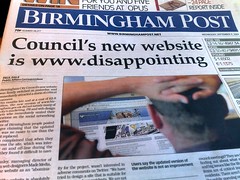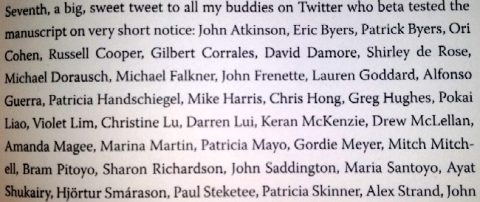Does Your Criticism Help?
Posted by Mitch Mitchell on Jul 5, 2017
One of the best things about writing a blog for as long as I've been writing one is that I have lots of stories that I get to rehash, either because I've forgotten I've already talked about it or it's in an old article that I know no one's probably ever going to read unless I link to it... like I just did... but I'm still going to tell the story because it helps me lead into a different topic than that one was about.
 |
Before I tell the story, I'm mentioning that there's a video at the end that's got the same title, which I created in 2013. It's rare that I have a video that inspires an article, let alone 4 years later. That's why I love creating things; you never know when you'll come back around to something.
Years ago I decided to start a newsletter. Back in 2003 I'd only seen 2 newsletters, and they were only text. I decided to try something a little different, since mine was on leadership.
My writing style wasn't as tight as it is now, but I still put together a 1,200 word article the first time out. Then I decided to share it with lots of people, asking them what they thought about it.
The responses were illuminating to say the least. The few people that commented hated this and that, didn't like the style or the colors, weren't crazy about some of the sentences I'd written or words I chose to use... but not a single person talked about the topic of the article itself, which is really what I wanted commentary on.
I decided that the fault was mine at the time, and I pretty much still stand by that. I stand by it because I never told people what I wanted commentary on, so they gave me all sorts of things... almost none of it helpful. It's the lack of "helpful" where I give myself a break and put some of the blame back in them.
Whenever I'm asked to give criticism or advice on a written piece of work, I go into it with only one thought; be helpful in all the ways I can be. This means I talk about the impression I got from the words; the dialogue if there's some; the choice of certain words and phrases; and anything I didn't understand. I only comment on the look of something if it came to me corrupted or misaligned, or if I'm asked specifically about that.
I've done this type of thing a lot over the years. I've written lots of book reviews on books that people have sent asking me to read and give an opinion on them. I helped Guy Kawasaki edit one of his books, which was very cool, and I even got my name in the acknowledgments. I helped someone edit a few of his screenplays, one of which actually got made into a movie (no credits on that one but it's okay because I never saw it lol).

This means I know a lot about helpful criticism and whether what you do is that or something else. When you decide to help someone, solicited or not, are the words you're using helping that person or making that person want to crawl into a hole and never try again?
The video covers the overall topic, so I'm doing something different here. Below are 5 tips towards helping others with your advice, or criticism; whichever word you wish to use.
1. Don't be blunt unless you're saving their life.
If people feel an attack coming, they'll shrivel up before you even get a single word out, and most of the time that means whatever your message is will be wasted.
Anyone who tells you they want a blunt opinion is lying to you. Even with the best of intentions, unless you have a reputation for it and get paid lots of money to do it, no one wants to be berated... which is how your criticism will come across. I'm not saying to not be truthful; I'm saying to figure out the best way to say what you need without hurting anyone's feelings.
2. Choose your words carefully when it's criticism that's coming out of your mouth. If you begin a statement with "you're the worst writer in the world and here's why", who would want to listen to you? Instead, maybe something like "that's not bad, but I'd like to offer some suggestions if I may", or something like that.
Think about it this way. How many fights do you think have started because someone said something the wrong way, whether they meant well or not? How many friendships have ended? How many people have left jobs or caused someone else to leave?
3. If you're going to criticize, you'd better offer some alternatives. If you're such an expert in determining why someone is faulty in some way, you need to be an expert in giving advice on how a person can correct those issues. Otherwise you're just a blowhard; no one wants to listen to that.
Whenever I'm asked my opinion, I like to take some time and come up with 3 possibilities or options and how I think they might play out. I also ask a lot of questions before I do this because one of the worst things to do is not have enough information or know what the person's intent is before you try to help.
4. Offer some positive reinforcement. Unless someone really messed up and you're reading them the riot act, you need to find ways to make sure that when people leave after you've talked to them that they're not feeling defeated and demeaned. If people don't have a reason to improve, they won't.
5. If you weren't asked for help, don't criticize at all. The thing about learning how to listen to others is that sometimes all they want is some support, or maybe some help, without being beaten up for not being perfect.
This is a lesson I had to learn, and trust me it helped a lot once I got married. Everyone doesn't want you to "save" them; sometimes they just want someone to listen.
That's all I have, so it's time for the video. I'm laughing at the beginning because I heard a beep and wasn't sure if I was recording or not. That's what happens sometimes when you're doing it live, as I used the live Google Hangout instead of recording the video the normal way. If you actually watch the like the video, please "like" it and comment:
https://youtu.be/7lk-hK2HQmg

